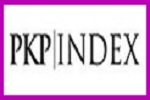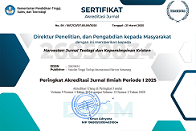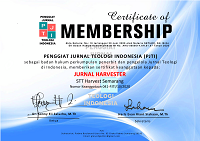Woke Washing Marketing dalam Perspektif Teologi Mandat Budaya
Abstract
Woke washing marketing is a term used for companies that take advantage of social and environmental issues through marketing their products without committing to implementing them within their own company. This article aims to provide a Christian perspective on woke washing marketing based on the cultural mandate contained in the Bible. The research method used is an interpretative approach, which interprets the phenomenon of woke washing marketing from the perspective of cultural mandate theology. The results of this study state that the woke washing marketing strategy is contrary to the theology of cultural mandate because it only makes social issues and environmental issues a trend that brings profit to the company, without committing to fight for these issues.
Abstrak
Woke washing marketing adalah istilah yang digunakan untuk perusahaan-perusahaan yang mengambil keuntungan terhadap isu-isu sosial dan lingkungan hidup melalui pemasaran produk mereka tanpa komitmen menerapkannya di dalam perusahaan mereka sendiri. Artikel ini bertujuan untuk memberikan perspektif Kristen terhadap woke washing marketing berdasarkan mandat budaya yang tertuang dalam Alkitab. Metode penelitian yang digunakan adalah pendekatan interpretatif, yaitu menginterpretasikan fenomena woke washing marketing dari sudut pandang teologi mandat budaya. Hasil penelitian ini menyatakan bahwa strategi woke washing marketing bertentangan dengan teologi mandat budaya karena hanya menjadikan isu sosial dan isu lingkungan sebagai trend yang mendatangkan keuntungan bagi perusahaan, tanpa berkomitmen memperjuangkan isu-isu tersebut.
Full Text:
PDFReferences
Bender, Kimlyn J. “Christ, Creation and the Drama of Redemption: ‘The Play’s the Thing . . .’” Scottish Journal of Theology 62, no. 2 (May 1, 2009): 149–174. https://www.cambridge.org/core/product/identifier/S0036930609004670/type/journal_article.
Cammaerts, Bart. “The Abnormalisation of Social Justice: The ‘Anti-Woke Culture War’ Discourse in the UK.” Discourse and Society 33, no. 6 (2022): 730–743.
Cox, William F. “Relationship of Enlightenment to the Cultural Mandate for a Biblical View of Education.” Journal of Research on Christian Education 9, no. 1 (March 2000): 7–30. http://www.tandfonline.com/doi/abs/10.1080/10656210009484895.
Erin Dowell & Marlette Jackson. “‘Woke-Washing’ Your Company Won’t Cut It.” 27 Juli, 2020. woke-washing-your-company-wont-cut-it?_x_tr_sl=en&_x_tr_tl=id&_x_tr_hl=id&_x_tr_pto=tc.
Fredrikson, Katarina. Woke-Washing or Altruism?, 2021.
Griffin, R., Recht, H., & Green, J. “# Metoo: One Year Later.” # Metoo: One year later. (2018). https://www.bloomberg.com/graphics/2018-me-too-anniversary/%0AHart, C. G.
Herbert, Nadiem. “Woke-Washing” a Brand: Socially Progressive Marketing by Nike on Twitter and the User Response to It 2, n.d. https://www.divaportal.org/smash/record.jsf?pid=diva2:1438652.
Johnson, Elizabeth A. “The Incomprehensibility of God and the Image of God Male and Female.” Theological Studies 45, no. 3 (September 4, 1984): 441–465. http://journals.sagepub.com/doi/10.1177/004056398404500302.
Kaul, Aseem, and Jiao Luo. “From Social Responsibility to Social Impact: A Framework and Research Agenda.” SSRN Electronic Journal (2019). https://www.ssrn.com/abstract=3575027.
Levine, Daniel H. “Assessing the Impacts of Liberation Theology in Latin America.” The Review of Politics 50, no. 2 (August 5, 1988): 241–263. https://www.cambridge.org/core/product/identifier/S0034670500015667/type/journal_article.
Lustig, Andrew. “The Image of God and Human Dignity: A Complex Conversation.” Christian bioethics: Non-Ecumenical Studies in Medical Morality 23, no. 3 (October 26, 2017): 317–334. http://academic.oup.com/cb/article/23/3/317/4565812/The-Image-of-God-and-Human-Dignity-A-Complex.
Moritz, Joshua M. “Animals and the Image of God in the Bible and Beyond.” Dialog 48, no. 2 (June 8, 2009): 134–146. https://onlinelibrary.wiley.com/doi/10.1111/j.1540-6385.2009.00449.x.
Sobande, Francesca. “Woke-Washing: ‘Intersectional’ Femvertising and Branding ‘Woke’ Bravery.” European Journal of Marketing 54, no. 11 (December 2, 2020): 2723–2745.
Vredenburg, Jessica, Sommer Kapitan, Amanda Spry, and Joya A. Kemper. “Brands Taking a Stand: Authentic Brand Activism or Woke Washing?” Journal of Public Policy & Marketing 39, no. 4 (October 14, 2020): 444–460. http://journals.sagepub.com/doi/10.1177/0743915620947359.
Waldrop, Charles T. “Revelation, Redemption, and the Divinity of Jesus Christ.” Scottish Journal of Theology 31, no. 6 (December 2, 1978): 501–515. https://www.cambridge.org/core/product/identifier/S0036930600042113/type/journal_article.
Warren, Danielle E. “‘Woke’ Corporations and the Stigmatization of Corporate Social Initiatives.” Business Ethics Quarterly 32, no. 1 (January 21, 2022): 169–198. https://www.cambridge.org/core/product/identifier/S1052150X21000488/type/journal_article.
Wolterstorff, Nicholas. “The Bible and Economics.” Transformation: An International Journal of Holistic Mission Studies 4, no. 3–4 (July 1, 1987): 11–19. http://journals.sagepub.com/doi/10.1177/026537888700400403.
Zaluchu, Sonny Eli. “Strategi Penelitian Kualitatif Dan Kuantitatif Di Dalam Penelitian Agama. Jurnal Teologi Injili Dan Pembinaan Warga Jemaat,.” Jurnal 4 (2020): 28–38.
DOI: https://doi.org/10.52104/harvester.v9i2.248
Refbacks
- There are currently no refbacks.
This work is licensed under a Creative Commons Attribution-ShareAlike 4.0 International License.
HARVESTER telah terindeks pada situs:
  |   |  |  |  |
|






1.png)
